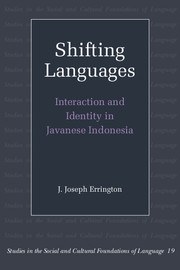Book contents
- Frontmatter
- Contents
- List of figures, maps, and tables
- Acknowledgements
- Preface: suggestions for use
- Note on orthography and transcription
- Map 1 The Indonesian archipelago
- Map 2 Eastern Central Java
- 1 Introduction
- 2 A city, two hamlets, and the state
- 3 Speech styles, hierarchy, and community
- 4 National development, national language
- 5 Public language and authority
- 6 Interactional and referential identities
- 7 Language contact and language salad
- 8 Speech modeling
- 9 Shifting styles and modeling thought
- 10 Javanese–Indonesian code switching
- 11 Shifting perspectives
- Notes
- Works cited
- Index of javanese and indonesian words
- General index
- Titles in the series
4 - National development, national language
Published online by Cambridge University Press: 01 June 2011
- Frontmatter
- Contents
- List of figures, maps, and tables
- Acknowledgements
- Preface: suggestions for use
- Note on orthography and transcription
- Map 1 The Indonesian archipelago
- Map 2 Eastern Central Java
- 1 Introduction
- 2 A city, two hamlets, and the state
- 3 Speech styles, hierarchy, and community
- 4 National development, national language
- 5 Public language and authority
- 6 Interactional and referential identities
- 7 Language contact and language salad
- 8 Speech modeling
- 9 Shifting styles and modeling thought
- 10 Javanese–Indonesian code switching
- 11 Shifting perspectives
- Notes
- Works cited
- Index of javanese and indonesian words
- General index
- Titles in the series
Summary
The monopoly of legitimate education is now more important, more central than is the monopoly of legitimate violence.
(Gellner 1983:34)In south-central Java, Indonesian is a national but un-native language. It lacks self-evident politically or culturally salient attachments to a primordial, native-speaking community.1 That very un-nativeness has been key to the success of Indonesian language development, a state-fostered drive to “reduce arbitrary social and linguistic heterogeneity through the fast growth of functional heterogeneity within a single language” (Neustepny 1974:37). That same success licenses visions of incipient language shift like Someya's, quoted in the introduction.
But such programmatic, state-centered evaluations do not speak to the ways that the larger project of development might shape perceptions and uses of Indonesian by its un-native speakers; nor do they consider Indonesian's role as a positive and not just an un-native factor in the growth of an Indonesian national identity. To speak to these questions, and redress these gaps, I sketch here Indonesian's sociohistorical grounds, and consider its potential as a symbolic resource for modernist, nationalist ideology. Because Indonesian's values have derived from its groundings first in a colonial and now in a national state apparatus, I consider first its historical place in each as a “nexus of practice and institutional structure” (Abrams 1988:58).
To consider nationalism and developmentalism as facts which might shape understandings of that language in use, I then recruit the selfstyled “philosopher of industrialization,” Ernest Gellner (1964:72). His abstract, theory-driven account of language, modernity, and nationalism helps here to explicate the New Order's self-legitimizing developmentalism, and to locate Indonesian in that project.
- Type
- Chapter
- Information
- Shifting Languages , pp. 51 - 64Publisher: Cambridge University PressPrint publication year: 1998



